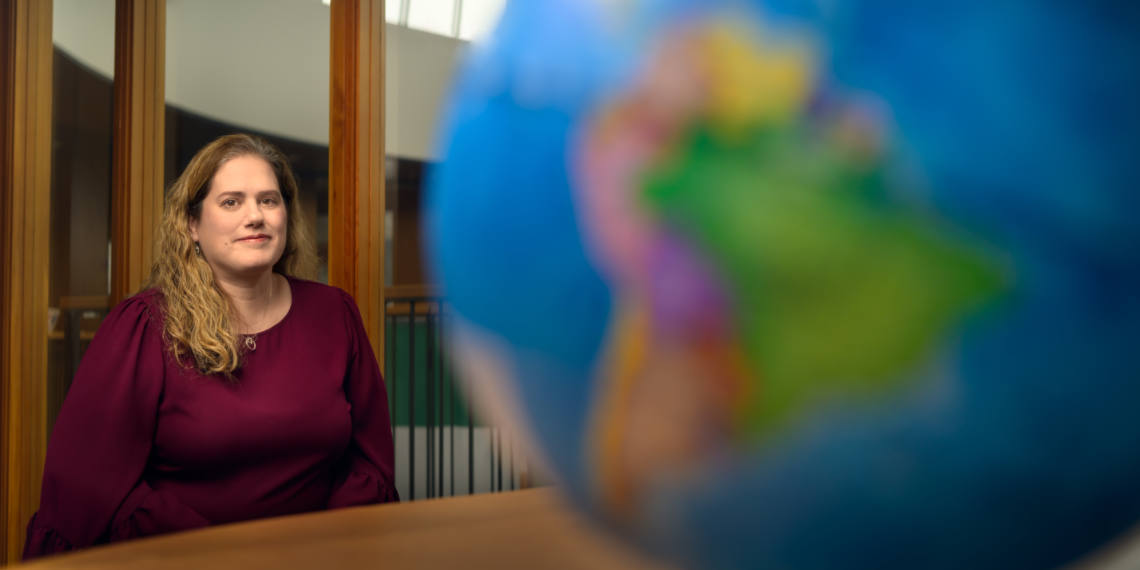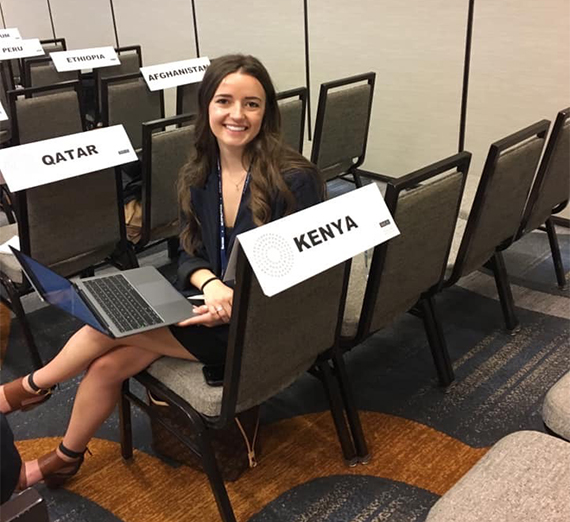Modeling United Nations' Global Goals
Gonzaga's Model UN, brought to Gonzaga via a former student and facilitated by Arts & Sciences Associate Dean Stacy Taninchev, challenges students to challenge their preconceived notions and be global citizens.

If we aren’t looking for them, life-changing opportunities to accompany our students can wildly alter our most basic assumptions about our own “path”. This old as time story could be written for political science professor and chair Stacy Taninchev and Gonzaga's Model UN. Arriving at GU as an assistant professor with her eye on intergovernmental organizations and conducting statistical analyses, she was approached by her then-Chair and student Michael Imasua (’11) to become the project's faculty advisor. Michael, the project's champion, brought his knowledge of the Model UN's structure from another college and insisted Stacy attend their next meeting; what Stacy encountered convinced her immediately – academic rigor, public speaking, reasoning, and research. At that moment, she knew, "I can't not be involved in this," and the rest is history.
After Michael and others worked to transition the program from student life to an academic program and a course housed under the political science department, Stacy worked to establish a cadence for each semester. In the Fall, students dive deep into the United Nations – its policies, history, and governing structure. Using this knowledge, they then learn their assigned country's various topical positions, history, and, often, culture. After being assigned to a committee, which could pertain to human rights, gender, or peace-building, students work into their winter break, crafting their position papers and preparing to defend their country's position. What differentiates Model UN from simply learning in the classroom or reading a book is that students must communicate their knowledge in the MUN community, and often with people they've never met. This experiential learning forges their knowledge almost by fire. Students must be agile, leveraging their hard-won knowledge of a place and its people on the spot and through a mindset of not "we or I," but "Greece" or "Afghanistan," depending on their assignment that year.
Because students commit to a country's perspective, they inevitably confront stances that go against their personal views of the world. It is not uncommon for students to represent countries that take a non-accepting position on LGBTQ rights or are a state under review and an authoritarian government. Students must set aside their values in the moment to put themselves in the shoes of a country whose position they may disagree with. Taninchev notes students' most significant growth comes from the MUN's higher aim of solving global problems, working with others from across the globe, and pushing themselves to move through discomfort to a clearly articulated position contrary to their own.
While Taninchev stresses that MUN is less a space for competition and awards, she can't help but beam when discussing its successes – from awards at Northwest Model United Nations (NMUN) conference in Portland to its alums. This past February at the Northwest Model UN, students took home the Outstanding Delegation Award, Outstanding Position Paper Award, and Distinguished Delegate Award. And alums continue to make Taninchev proud. She maintains relationships with many of them, rattling off their latest positions – noting their work goes beyond titles to real-world impacts. Paúl Quiñonez Figueroa, for instance, is currently the Deputy State Director for Senator Maria Cantwell. Caitlin Pallai, the Public Information Officer at the City of Fargo. But what about the student who started it all? After taking on a role at the UN Office of the Secretary General's Envoy on Youth, Michael Imasua is now a Senior Policy Analyst NY Governor's Office of Storm Recovery.
Who better to lead the Gonzaga Model UN than a political science professor who takes the university's mission to heart, leading by example by bridging the academic with the hands-on, the theory with the practice than Dr. Stacy Taninchev? When asked what advice she would give students overwhelmed with today's problems, Taninchev draws from her experiences, urging students to find the common thread in their passions. While acknowledging that no single issue exists in a vacuum, Taninchev says it's essential to stay the course. Over the years, that focus for her has morphed and included intergovernmental organizations, the United Nations to climate change, and racial justice. Through it all, she uses the UN's Sustainable Development Goal 16 as her guiding star, promoting peace, justice, and strong institutions.
- Careers & Outcomes
- Arts & Culture
- Alumni
- Academics
- Diversity & Inclusion
- Global Impact
- Student Life
- College of Arts & Sciences
- Political Science
- International Studies

